For some students, Facebook provides a much-needed study break during midterm week, but a recent study suggests that Facebook can actually make people feel worse about their own lives.
The study, conducted at Utah Valley University and published in January in the journal, “Cyberpsychology, Behavior and Social Networking,” is based on previous research that people use computer-mediated communication like Facebook to optimize their self-presentation, or present themselves in a positive way they want others to see.
“We usually see the bright side of others, especially from the positive images and comments posted on Facebook,” said Hui-Tzu Grace Chou, sociologist and main researcher of the study. “If we only see the sunny sides of others, it is easier for people to feel that others have a better life, or life is unfair, especially when they themselves are having some difficult times in life.”
Chou and research partner, Nicholas Edge, surveyed 425 undergraduate students from UVU, asking them to gauge their agreement with statements like, “Many of my friends are happier than me,” and “Life is fair,” while comparing factors such as how long they had a Facebook, how often they used it and how many of their Facebook friends are essentially strangers.
The study found that people who have had Facebook longer and had more Facebook friends they didn’t actually know perceived others to be happier than they were and thought life was less fair.
Polly Isurin, a fourth-year in painting and drawing who has never had a Facebook account, said she’s never felt the need for it and doesn’t plan on getting one. She said she feels that on top of having more time than those with a Facebook, she’s better off without it.
“I wouldn’t say I’m necessarily happier,” Isurin said. “Just probably less self-conscious because I don’t compare myself because I have nothing to compare it to.”
Chou said there are also positive sociological effects of Facebook, like connecting with friends and a sense of belonging, but it shouldn’t replace face-to-face interaction.
Shelby Spressart, a third-year in biology, said she tries to be careful about the time she spends on Facebook.
“In general I like it because it’s mostly how I find things to do with my friends and see what’s going on and pictures,” Spressart said. “I get on it, then I see what’s going on, then I get off. I can’t stay on too long because then I just get frustrated with other people.”
Hollie Kinney, a fourth-year in speech and hearing science, said she enjoys Facebook because of the sometimes negative light in which people present themselves.
“I spend a lot of time on Facebook out of boredom.” Kinney said. “I think it’s fun, it gives people something to do and you can see which of your friends are idiots and drama wh-res. That’s kind of an elitist thing to say, but whatever.”
Facebook has filed registration documents with the U.S. Securities and Exchange Commission to go public, and has set a preliminary goal of $5 billion for its initial public offering.
Spressart said she’s thought about quitting Facebook so she wouldn’t have to hear about peoples’ lives all the time, but could never bring herself to do it.
Isurin said the people she knows who don’t have a Facebook had it at one point, then got rid of it most likely due to the way people present themselves.
“I don’t think Facebook is bad,” Isurin said. “But I think it has gotten out of hand.”


